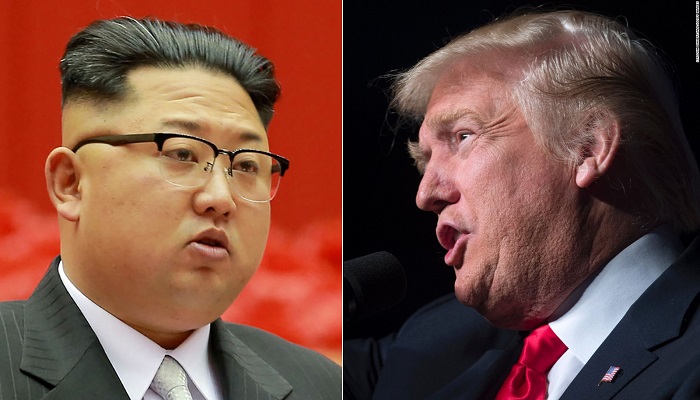
After North Korea’s several missile experiments U.S. President Donald Trump certainly has a point when he complains that he inherited a difficult problem in North Korea. North Korean leader Kim Jong Un has shown no interest in negotiation, or even in listening to what anyone has to say about his reckless pursuit of nuclear weapons and the long-range missiles needed to deliver them.
But the fact that Trump inherited the problem does not absolve him of responsibility for addressing it. So far, he has failed even to articulate, much less implement, a strategy for dealing with North Korea. Almost one year into his presidency, his only achievement has been to secure additional sanctions at the United Nations. Worse still, his bitter complaints about his predecessors suggest that he has no idea what to do next.
Trump’s latest attempt to deal with the problem came a couple of weeks ago when he noisily announced that his administration was putting North Korea back on the U.S. Department of State’s list of state sponsors of terrorism. His decision, though justified in light of Kim’s behavior, was largely symbolic, as was President George W. Bush’s October 2008 decision to remove North Korea from that list in the first place.
The Trump White House claims that re-designating North Korea as a state sponsor of terrorism is a “critical step.” It is not. In fact, the U.S. Treasury Department does not even require such a designation to formulate additional sanctions.
State sponsors of terrorism are ineligible for U.S. military support which was hardly a possibility for North Korea.
And the United States is legally prohibited from supporting any loans or other forms of assistance offered to state sponsors of terrorism by international financial institutions of which the U.S. is a member. North Korea, however, is not a member of any international financial institution.
As many have pointed out, the terrorism list is by no means a complete compendium of countries whose security services may have been involved with terrorist groups. Currently, the full list includes just four countries: Iran, North Korea, Sudan and Syria. Despite the late Venezuelan dictator Hugo Chavez’s well-known ties to the Revolutionary Armed Forces of Colombia (FARC) — which the U.S. State Department designates as a terrorist organization — Venezuela managed to stay off the list. Similarly, many believe that Pakistan’s security services maintain ties with groups that would clearly qualify the country for inclusion on the list.
Still, even as a symbolic gesture, the context of Bush’s decision to remove North Korea from the list was entirely different from that of Trump’s decision to restore it. In 2008, North Korea had satisfied certain conditions. First, it agreed to participate in the six-party talks with China, Japan, Russia, South Korea and the U.S. (which I represented as assistant secretary of state for East Asian and Pacific affairs). The talks’ explicit goal was to denuclearize the Korean Peninsula, and they resulted in North Korea closing its nuclear facility in Yongbyon.
Moreover, at the time of its delisting, North Korea was also participating in talks to establish a verification system for its nuclear activities. The regime invited international inspectors to Yongbyon and provided substantial records of the Yongbyon reactor’s operations, which are still one of the most accurate resources for measuring the amount of plutonium actually produced there.
At the time, North Korea had agreed to blow up the Yongbyon reactor’s cooling tower, to reciprocate the U.S.’s symbolic act with one of its own. It was a partial deal, to be sure. But Trump would have taken it to a New York minute.
Subsequently, the agreement began to unravel owing to North Korea’s steadfast refusal to acknowledge that it ever had a program, past or present, to develop fissile material through highly enriched uranium (HEU). The regime failed to explain international purchases of equipment consistent with such a program, and samples of specialized materials that it provided to U.S. diplomats raised suspicions further.
After a several-year hiatus, the Yongbyon nuclear reactor is operational once again. Notably, all six of the underground nuclear tests that North Korea has conducted since 2006 have been consistent with plutonium harvested from the reactor before the six-party talks. The possibility that North Korea is operating an HEU facility somewhere in its tunneled landscape is undoubtedly a cause for great concern. But Yongbyon, contrary to those who have argued that it was on its last legs, has always constituted a clear and present danger.
The fact that Trump can put North Korea back on the terrorism list with little bureaucratic fuss and virtually no international repercussions demonstrates why the list is a useful sanction for the U.S. to have at its disposal. The standard for de-designation — no acts of terrorism or cooperation with terrorist groups in the past six months — is flexible enough that removal from the list can readily be used as a diplomatic bargaining chip. Likewise, de-designation can easily be reversed when conditions merit it — such as when Kim orchestrates the assassination of his half-brother in a Malaysian airport.
Solving the North Korea problem will require a seriousness of purpose and a level of discipline that Trump has not yet exhibited. An effective policy would include cooperation with China, not gushing flattery for China’s leaders. That cooperation would have to be based on a long-term commitment, not one-off transactions. And, perhaps more importantly, it would require daily engagement not just with China but with all of the other regional stakeholders as well.
Needless to say, such a policy would benefit from a U.S. secretary of state who is committed to maintaining a team of experienced diplomatic professionals, and from recognition by Trump and his advisers that building on the efforts of one’s predecessors is more effective than accusing them of making the job harder. Unfortunately, that last lesson continues to elude this administration

Post Your Comments